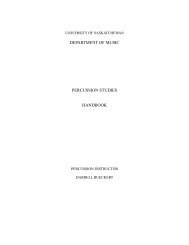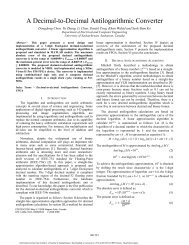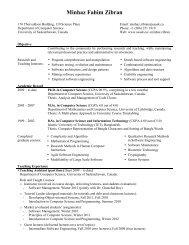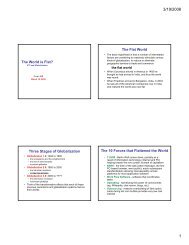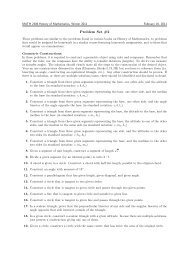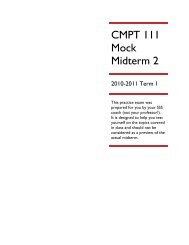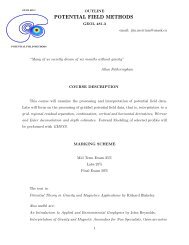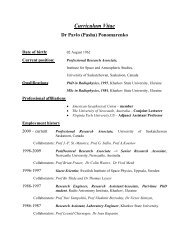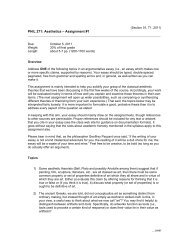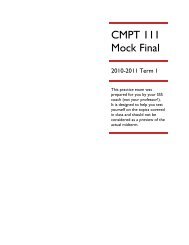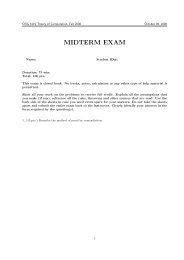Water Resources Engineering - Homepage Usask
Water Resources Engineering - Homepage Usask
Water Resources Engineering - Homepage Usask
Create successful ePaper yourself
Turn your PDF publications into a flip-book with our unique Google optimized e-Paper software.
G14. ADVANCED AQUATIC ECOLOGY<br />
(KUL-code: IC05 (Th); IC06 (Pr))<br />
Lecturer: DE MEESTER L.<br />
ECTS-credit: 5 pts<br />
Contact hours: 30 hrs. of theory/30 hrs. of practical<br />
Prerequisites: Basic knowledge of aquatic ecology and ecological concepts<br />
Time and place: 1 st semester, VUB<br />
Course syllabus: Lecture notes<br />
Evaluation: Quotation on a personal work and an oral exam with written preparation<br />
Comparable handbook: Limnoecology: The ecology of lakes and streams, W. Lampert & U. Sommer, Oxford<br />
University Press, 1997<br />
Introduction to ecological modeling, putting theory into practice, M. Gillman & R.<br />
Hails, Blackwell Science, 1997<br />
Moss, B., 1998. Ecology of Fresh <strong>Water</strong>s, Man and Medium, Past to future. Third ed.<br />
Blackwell Science.<br />
The ecology of tropical lakes and rivers, A.I. Payne, 1986, John Wiley & Sons, New<br />
York<br />
Additional information: -<br />
Learning objectives:<br />
The course aims at providing the students an in-depth insight into central concepts and new developments in<br />
aquatic ecology, with emphasis on topics that are particularly relevant to tropical and subtropical systems.<br />
Building on a basic knowledge of the structure and function of aquatic ecosystems (e.g. course on Aquatic<br />
Ecology, GM22), it is the purpose that the student obtains the necessary insight and skills to design monitoring<br />
and experimental studies in aquatic ecosystems. Concepts are introduced in such a way that they can be<br />
incorporated into models describing ecological relationships within aquatic ecosystems, such that their<br />
responses to perturbations and management practices can be evaluated. In doing this, much emphasis is also<br />
given to the design of field and experimental studies that are intended to collect the data and parameter values<br />
necessary to build realistic models.<br />
Course description:<br />
A) Ecological concepts:<br />
- Concepts in population biology: dynamics of competitive and predator-prey interactions (data, case studies<br />
and models); meta-population dynamics;<br />
- Patterns and dynamics of bio-diversity;<br />
- Concepts in landscape ecology ; and<br />
- Concepts in evolutionary biology (e.g. life history evolution, dispersal in time and space, dia-pause<br />
strategies; uncertainty and bet-hedging);<br />
B) Tropical and subtropical aquatic biomes:<br />
- Tropical rivers and pseudo-terrestrial ecosystems;<br />
- Ephemeral pools;<br />
- Ancient lake biota; and<br />
- Salt lakes and salt marshes;<br />
C) Applied issues:<br />
- Resistance, resilience, recovery;<br />
- Dynamics of overexploitation;<br />
- The introduction of exotic species;<br />
- Global change and large-scale impacts; and<br />
- Lake management<br />
D) Tools:<br />
- Strengths and weaknesses of the experimental approach; experimental design;<br />
46 / Course syllabi



